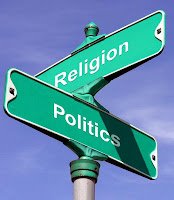Religion and the 2012 Elections
The Founding Fathers believed that only men of “virtue” could lead America and only citizens who practiced virtue in their lives could preserve and protect the republic. They were right.
By Alan Caruba
 The one thing that Presidents from Washington through to modern times have held in common was the belief that religion was a central component of the life of the republic.
The one thing that Presidents from Washington through to modern times have held in common was the belief that religion was a central component of the life of the republic.
Calvin Coolidge, President from 1923 to 1929, said “Our government rests upon religion. It is from that source that we derive our reverence for truth and justice, for equality and liberality, and for the rights of mankind. Unless the people believe in these principles they cannot believe in our government. There are only two main theories of government in our world. One rests on righteousness and the other on force. One appeals to reason, and the other appeals to the sword. One is exemplified in the republic; the other is represented by despotism.”
Ronald Reagan echoed this view saying, “Freedom prospers when religion is vibrant and the rule of law under God is acknowledged.”
For Barack Obama, Sundays have often been devoted to playing golf. A self-declared Christian, there are widespread concerns that he was and is a Muslim, given his childhood as the adopted son of an Indonesian Muslim, his mother’s second husband. In the 2008 campaign, he managed to overcome the fact that his spiritual mentor, Rev. Jeremiah Wright, led a Chicago church with a doctrine of Black Liberation theology that was frequently highly critical of America.
When John F. Kennedy ran for office, the question was whether his being Catholic would play a role in whether he could be elected. He put that question to rest. Obama had to sever his ties with Rev. Wright in order to seek and win election.
As Mitt Romney closes in on the Republican nomination some liberals are already sniping at his Mormon faith. while Rick Santorum’s emphasis on the strictures of his faith has played an unknown factor in his fluctuating fortunes.
The Gallup organization began systematically tracking religion in 1948, asking Americans to name the major religion with which they personally identified. Back then, two percent (2%) of Americans volunteered “no religion” and another three percent (3%) had an otherwise unidentified religious identity. By the 1970s, the number of Americans with no formal religious identity began to increase, reaching eleven percent (11%) by 1990.
By 2010, sixteen percent (16%) said they had no religious identity or had an otherwise undesignated response. A Gallup analysis noted that “Lack of identification with a formal religious group does not necessarily mean religion is irrelevant in a broad sense in a person’s life. One can remain quite religious, or at least spiritual, while at the same time eschewing attachment to or identity with a formal religion or denomination.”
The Gallup polling demonstrates that eighty-four percent (84%) of Americans, a huge majority, do identify themselves as affiliated in some fashion, formal or not, with a faith of choice.
Drawing on two surveys, the General Social Survey and the National Congressional Study, Mark Chavez, a professor of sociology, religion, and divinity at Duke University, author of “American Religion: Contemporary Trends”, concluded that traditional belief and practice is relatively stable, but that confidence in religious institutions has declined more than confidence in secular ones.
In a March 3rd, Wall Street Journal commentary, Peggy Noonan wrote, “The other day in a seminar at a university, a student of political science asked a sort of complicated question that seemed to be about the predictability of human response to a given set of political stimuli. I answered that if you view people as souls, believe that we have souls within us, that they are us, then nothing political is fully predictable, because you never know what a soul will do, how a soul will respond, what truth it will apprehend and react to.”
The current firestorm over the Obamacare mandate that contravenes personal conscience, a pillar of all religions, has ignited a debate over the separation of church and state. The Constitution specifically forbids “the establishment” of a state religion and, by extenstion, forbids the federal government from coming between an individual’s spiritual beliefs and its demands.
Coolidge also said “We do not need more intellectual power; we need more moral power. We do not need more knowledge; we need more character. We do not need more government; we need more culture. We do not need more law; we need more religion. We do not need more of the things that are seen; we need more of the things that are unseen.”
Religion is hardwired into humans. From the Stone Age onward, we have created religions as a means to cope with an often dangerous and indifferent world, and to peer into what Shakespeare called “The undiscovered country from whose bourn no traveler returns.” Consciously or not, three years into President Obama’s term, millions of Americans are reexamining their religious beliefs and I suspect this will play an important role in the outcome of the 2012 elections.
Americans may have grown more secular in their general outlook, but there is still that inner voice, their relationship with the faith into which they were born or they embraced—their soul—and the historic distrust of big government that will shape the outcome of the election.
The Founding Fathers believed that only men of “virtue” could lead America and only citizens who practiced virtue in their lives could preserve and protect the republic. They were right.
© Alan Caruba, 2012
Help Make A Difference By Sharing These Articles On Facebook, Twitter And Elsewhere:
